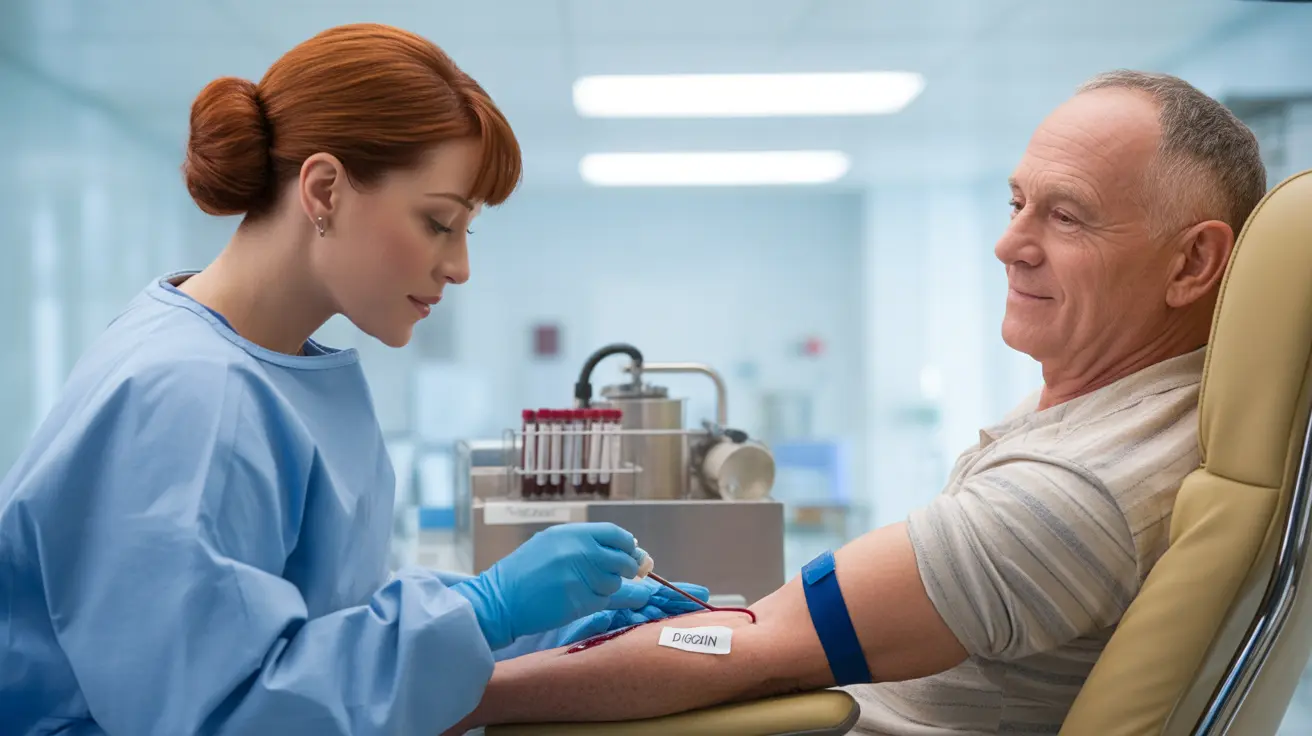If you're taking digoxin for heart conditions like heart failure or arrhythmia, regular blood testing is crucial for your safety and treatment success. A digoxin blood test measures the amount of this important heart medication in your bloodstream, helping healthcare providers ensure you're receiving the right dose for optimal therapeutic benefits while avoiding potentially dangerous side effects.
This comprehensive guide will explain everything you need to know about digoxin blood tests, including preparation requirements, timing, result interpretation, and factors that can affect your test outcomes.
What is a Digoxin Blood Test?
A digoxin blood test is a laboratory measurement that determines the concentration of digoxin in your blood. Digoxin, derived from the foxglove plant, is a medication that helps strengthen heart contractions and control heart rhythm. Because digoxin has a narrow therapeutic window—meaning the difference between an effective dose and a toxic dose is small—regular monitoring through blood tests is essential.
Why Digoxin Levels Need Monitoring
Regular monitoring of digoxin levels is crucial for several reasons:
- Prevent toxicity and dangerous side effects
- Ensure the medication is working effectively
- Account for individual differences in metabolism
- Adjust dosage based on kidney function
- Monitor interactions with other medications
Preparing for Your Digoxin Blood Test
Proper preparation is key to obtaining accurate test results. Your healthcare provider will give you specific instructions, but generally, you should:
- Take your digoxin dose at the same time each day
- Schedule your blood draw at the optimal time (usually 6-8 hours after your last dose)
- Inform your provider about all medications and supplements you're taking
- Continue taking your medication as prescribed unless instructed otherwise
Understanding Your Test Results
Digoxin blood test results are typically reported in nanograms per milliliter (ng/mL). The therapeutic range usually falls between 0.8 and 2.0 ng/mL, though optimal levels may vary based on individual factors and specific conditions being treated.
Signs of Abnormal Digoxin Levels
Being aware of potential signs of abnormal digoxin levels is important:
High Levels (Toxicity):
- Nausea and vomiting
- Vision changes or blurred vision
- Irregular heartbeat
- Confusion or dizziness
- Loss of appetite
Low Levels (Subtherapeutic):
- Return of heart failure symptoms
- Increased heart rate
- Shortness of breath
- Swelling in legs or ankles
- Fatigue
Frequency of Testing
The frequency of digoxin blood tests varies depending on several factors, including:
- Whether you're just starting the medication
- Stability of your condition
- Presence of other health conditions
- Changes in other medications
- Kidney function
Initially, you may need tests weekly until your levels stabilize. Once stable, testing may occur every few months or as recommended by your healthcare provider.
Frequently Asked Questions
What is a digoxin blood test and why is it important for heart failure or arrhythmia treatment?
A digoxin blood test measures the level of digoxin medication in your blood. It's essential for ensuring the medication is at therapeutic levels to effectively treat heart conditions while avoiding toxic effects that could be dangerous.
How should I prepare for a digoxin blood test and when is the best time to have my blood drawn?
Take your digoxin at the same time each day and schedule your blood draw 6-8 hours after your last dose. Continue your medication as prescribed unless told otherwise by your healthcare provider.
What do digoxin blood test results mean, and what are the signs of having too high or too low digoxin levels?
Normal results typically range from 0.8 to 2.0 ng/mL. High levels can cause nausea, vision changes, and irregular heartbeat, while low levels may result in return of heart failure symptoms or arrhythmia.
How often should digoxin blood tests be done to safely monitor my medication dosage?
Testing frequency varies based on individual factors but typically starts more frequently (weekly) when beginning treatment and may decrease to every few months once levels stabilize.
Can other medications or supplements affect my digoxin blood test results?
Yes, several medications and supplements can affect digoxin levels, including certain antibiotics, antacids, and potassium supplements. Always inform your healthcare provider about all medications and supplements you're taking.




